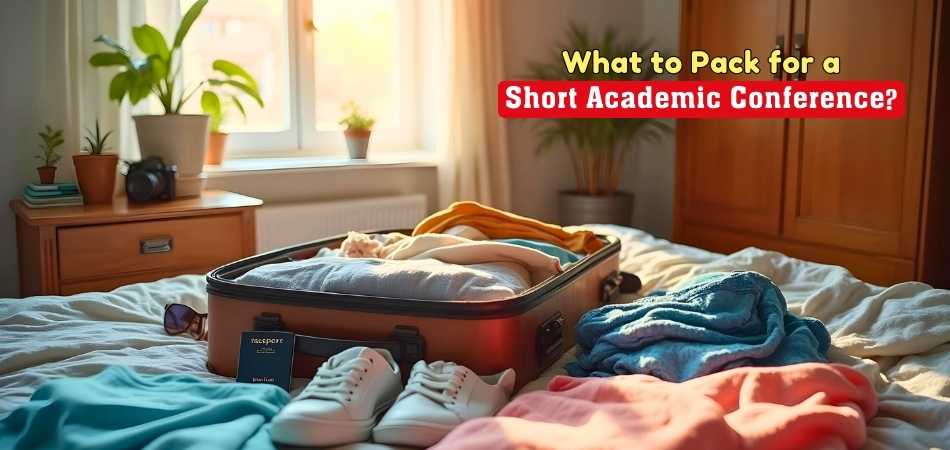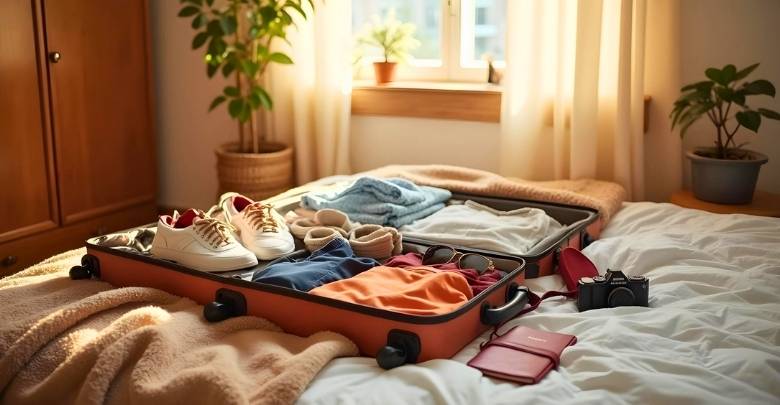Participating in a short academic conference can be a valuable opportunity for networking, learning, and sharing your research. However, packing the right items can make a big difference in how smoothly your experience goes. So, what to pack for a short academic conference?
For a short academic conference, pack professional attire, business cards, a notebook, laptop/tablet, chargers, printed conference materials, toiletries, and a reusable water bottle. Don’t forget your ID, travel essentials, and any necessary academic presentations or documents.
Keep reading if you’d like to learn more about what you need to pack to make your academic event successful.
What to Pack for a Short Academic Conference?- Must-Know Checklist
Short academic conferences provide an exciting opportunity for networking and sharing ideas. Packing effectively ensures you’re ready for both professional and personal needs during the event. Whether it’s a local gathering or one of the upcoming international conferences, preparation is very important. Here are some essentials to pack for an academic conference:
Plan Ahead for Professional Attire
Choose comfortable, polished clothing that aligns with the event’s dress code. Include a blazer or jacket for a formal touch. Pack mix-and-match outfits to save space while staying stylish. Ensure shoes are both professional and comfortable for long conference days.
Bring Plenty of Business Cards
Networking is a key part of conferences, so keep business cards handy. Pack more than you think you’ll need for unexpected opportunities. Use a cardholder to stay organized and avoid damage. Sharing your contact information leaves a lasting impression.
Don’t Forget Your Notebook and Pen
While laptops are great, notebooks are handy for quick notes. They’re useful during tech-free moments or in casual discussions. Choose a compact notebook for ease of carrying. A quality pen ensures you’re never caught unprepared.
Essential Electronics to Keep You Connected
Your laptop or tablet is crucial for presentations and note-taking. Don’t forget chargers, power banks, and necessary adapters for your devices. Organize cables with a small pouch to avoid tangles. Test your devices beforehand to ensure functionality.
Stay Prepared with Printed Conference Materials
Bring printed copies of your schedule, tickets, or presentation materials. It’s helpful if internet access becomes limited. Highlight key details for easy reference during the event. Keep these documents in a folder to maintain order.
Pack Toiletries for a Fresh Start Each Day
Carry travel-sized toiletries for convenience and compliance with security checks. Don’t skip essentials like toothpaste, deodorant, and face wipes. A reusable water bottle helps you stay hydrated throughout the event. Small self-care items keep you energized.
Secure Your ID and Travel Essentials
Your ID is essential for conference check-ins and travel. Keep travel documents like boarding passes or visas in an accessible spot. A small travel wallet can keep everything organized. Double-check these items before leaving for peace of mind.
Is Proper Packing Helping You Enjoy Academic Conferences?
Yes, proper packing can greatly improve your academic conference experience. Packing thoughtfully ensures you have everything needed for the event. It reduces stress and allows you to focus on learning and networking opportunities.
Packing essentials like chargers, documents, and professional outfits keeps you prepared for any situation. A checklist helps prevent forgetting important items. For example, knowing appropriate attire for women at academic conferences ensures confidence and comfort throughout the event.
Good preparation saves time and avoids last-minute hassles during travel. It gives you peace of mind and boosts productivity at conferences. Proper packing ensures you enjoy the event while presenting your best self professionally and personally.
What is the Best Way to Organize Your Essentials for Academic Conferences?
Preparing for an academic conference can feel overwhelming without a proper plan. Organizing your essentials ensures a smooth and productive experience. This guide will help you pack and organize smartly to avoid unnecessary stress.
Start with a Detailed Packing List
A packing list helps you remember everything you need for the conference. Divide items into categories like clothing, electronics, and documents. Keep the list handy to tick off items as you pack. This method saves time and reduces last-minute panic.
Organize Documents and Conference Materials
Use a folder or file to store conference tickets, schedules, and presentation documents. Arrange these items by their order of use. Keep the folder in your carry-on for quick access during travel. Always carry printed materials as a backup for digital copies.
Pack Electronics with Care
Store chargers, cables, and power banks in a small, labeled pouch. Ensure your laptop or tablet is fully charged before travel. Carry a universal adapter if attending an international conference. Keep electronics in a padded section of your bag for safety.
Choose the Right Bag for Convenience
A lightweight and durable bag makes carrying essentials easier. Select a bag with multiple compartments for organization. Use separate pockets for toiletries, snacks, and small items. This keeps everything accessible without digging through your belongings.
Prepare an Emergency Kit
Include basic medications, band-aids, and extra face masks in your kit. Add a small sewing kit for quick clothing fixes. Carry a reusable water bottle and healthy snacks for energy. This kit ensures you’re prepared for minor issues.
Recheck Everything Before You Leave
Review your packing list once more to ensure nothing is left behind. Check chargers, documents, and attire to confirm readiness. Ensure fragile items are packed securely to avoid damage. This final step gives peace of mind before departure.
What to Do If You Forget an Important Item?
Forgetting an important item at an academic conference can be stressful, but manageable. Staying calm and knowing how to improvise is essential. Here’s how to handle such situations effectively and minimize disruptions to your experience.
- Assess the Situation Quickly: Identify what you’ve forgotten and its importance for the event. Knowing its impact helps you decide the next steps.
- Ask for Help at the Venue: Check with the conference organizers or staff for assistance. They may have resources or alternatives to help you.
- Contact Your Network: Reach out to colleagues or attendees who might have the item. Collaboration can provide temporary solutions or helpful advice.
- Visit Local Stores: Locate nearby stores for a quick replacement or alternative. Many essential items can be easily found and purchased locally.
- Utilize Technology for Solutions: Digital copies of documents can replace missing physical copies. Use apps to manage tasks or retrieve essential data on the spot.
- Borrow from Fellow Attendees: Politely ask other participants for temporary use of the item. Most people are happy to help in such situations.
- Adapt and Improvise: Use what you have to create a makeshift solution. Flexibility and creativity often resolve unexpected challenges efficiently.
- Plan Better for the Future: Use this experience to refine your packing checklist. Avoid repeating the mistake by staying prepared for future events.
Top Tips for Selecting Essential Based on Trends at Academic Conferences
Packing for academic conferences can be challenging, especially with changing expectations. Staying informed about academic conference trends helps you prioritize essentials. The following section provides key tips for aligning your packing with current trends and needs:
Research the Conference Format in Advance
Know if the event is in-person, virtual, or hybrid. The format often determines the types of essentials you’ll need. For virtual conferences, ensure reliable internet and tech gear. In-person events may require business attire and travel accessories.
Adapt Your Wardrobe to Current Styles
Professional but modern attire reflects confidence and awareness of current trends. Choose comfortable outfits suited to long conference sessions. Accessories like smartwatches can complement your look and add functionality. Always check the event dress code for specific guidelines.
Prioritize Lightweight and Multifunctional Electronics
Compact devices are convenient for travel and align with trends of minimalism. Laptops, tablets, or multi-port chargers save space and weight. Always carry a power bank to avoid running out of battery. Keep devices updated and ready for presentations or notes.
Include Items for Sustainable Practices
Eco-friendly options, like reusable water bottles, reflect awareness of sustainability trends. Opt for tote bags over single-use plastic carriers. Look for travel-sized, refillable toiletry containers for added convenience. Conferences increasingly value environmentally conscious participants.
Focus on Networking Essentials
Business cards remain a key tool for networking despite the digital shift. Digital alternatives like QR codes are becoming more common. Keep contact-sharing methods versatile to adapt towards all preferences. Effective networking reflects preparation and professionalism.
Stay Ready for Unplanned Situations
A small emergency kit prepares you for unexpected challenges. Include basic medications, safety pins, and spare device chargers. Being proactive reduces stress and keeps you focused on your goals. Preparedness is a growing trend in academic conference culture.
Questions and Answers
If you are new to attending short academic conferences, packing can be challenging. To help you prepare and avoid common pitfalls, here are some frequently asked questions with answers to guide you in packing for success.
What Accessories Better My Conference Experience?
Carry noise-canceling headphones to block distractions during travel or breaks. A smartwatch helps you stay on schedule and manage notifications discreetly. Accessories like these add convenience and efficiency.
How Do I Pack for Different Weather Conditions?
Check the weather forecast for the conference location before packing. Bring layers like a light jacket or sweater for unexpected changes. Waterproof items, like an umbrella, are useful if rain is expected. Always pack versatile clothing for unpredictable conditions.
What Bag Is Best for Carrying Essentials During the Event?
A medium-sized backpack or messenger bag with multiple compartments is ideal. It allows you to organize essentials like notebooks, chargers, and snacks. Choose a bag that’s lightweight and comfortable to carry throughout the day.
What Type of Shoes Should I Wear for a Conference?
Wear comfortable shoes that look professional and can handle long periods of walking or standing. Closed-toe shoes are a safe option for formal settings. Break them in before the event to avoid discomfort.
How Can I Keep My Belongings Secure During a Conference?
Use a small, combination-lock bag or pouch for valuable items. Keep your ID, wallet, and gadgets close at all times. Avoid leaving your belongings unattended during the event.
Bottom Line
Having the right packing list is crucial to ensuring a smooth and productive academic conference. By focusing on essentials like professional attire, business cards, electronics, and printed materials, you can be fully prepared for any situation.
So, knowing what to pack for a short academic conference? Involves aligning your needs with the event’s format and trends, including sustainable practices and networking tools.
When you prepare properly, you save time, reduce stress, and make the most of every opportunity. Don’t forget to create a checklist, stay organized, and plan for emergencies to avoid last-minute hassles. With thoughtful packing, you can confidently focus on learning, connecting, and sharing your ideas at the conference.








